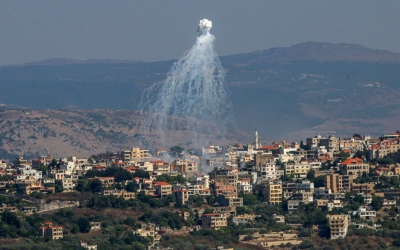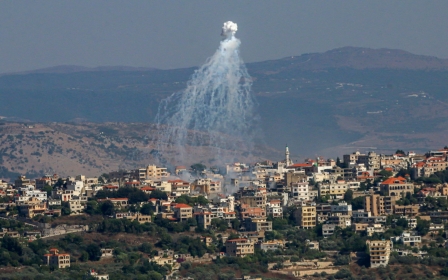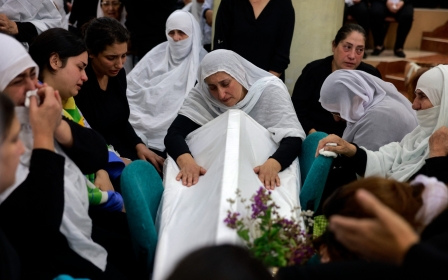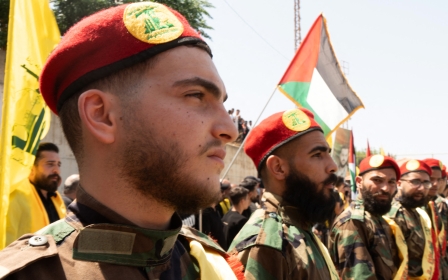Lebanon: Explosion reported in Beirut as Israel claims it targeted Hezbollah commander

Israel's military said it carried out a strike targeting a Hezbollah commander in the Lebanese capital Beirut on Tuesday, in response to a deadly attack on the occupied Golan Heights over the weekend.
The fate of Hezbollah commander Fuad Shukr, who was the alleged target of the strike, is unclear at the time of writing, with Reuters reporting that he had survived and Al Arabiya and a local Lebanese media outlet reporting that he was killed in the strike. MEE could not immediately independently verify the casualties from the strike.
At least one woman and several people were wounded by the strike, Lebanese state media reported.
Footage posted on social media showed large plumes of smoke rising above a collapsed residential building in the capital's southern Haret Hreik neighbourhood, with several injured people receiving help and medical assistance from passersby.
Lebanon's state-run National News Agency said the strike targeted an area near Hezbollah's Shura Council.
New MEE newsletter: Jerusalem Dispatch
Sign up to get the latest insights and analysis on Israel-Palestine, alongside Turkey Unpacked and other MEE newsletters
The Israeli military said in a statement that it conducted "a targeted strike in Beirut on the commander responsible for the murder of the children in Majdal Shams and the killing of numerous additional Israeli civilians".
Lebanon's Prime Minister Najib Mikati condemned the strike calling it a "criminal act".
Lebanese Foreign Minister Abdallah Bou Habib said the ministry was planning to file a complaint at the United Nations and said he hopes Hezbollah’s response to an Israeli strike would be "proportionate" and not lead to a full-scale war.
Hamas called the act a "dangerous escalation".
Both Russia and Iran condemned the strike, with the latter calling it "sinful and cowardly Israeli aggression".
Russia's state-run TASS news agency quoted the foreign ministry as saying that the attack was a "flagrant violation of international law".
Despite the serious escalation, White House spokesperson Karine Jean-Pierre said that the US does not believe that war is "inevitable" between Israel and Hezbollah.
Hezbollah and Israel have exchanged near-daily fire since the Hamas-led 7 October attacks on southern Israel, with the Iran-backed Lebanese group firing rockets at Israel in what it says is in solidarity with besieged Palestinians in Gaza.
Tensions have been running particularly high this summer but escalated on Saturday after Israel and the US blamed Hezbollah for a rocket attack on Majdal Shams, a Druze village in the occupied Golan heights that killed 12 children and teenagers.
Israeli Prime Minister Benjamin Netanyahu said that Israel’s response to the attack would be "severe".
Hezbollah has denied it was responsible, saying the children were killed instead by a misfired Israeli Iron Dome air-defence missile.
Speaking to reporters in Washington, Vedant Patel, the State Department's deputy spokesman, refused to answer questions about whether Israel had informed the US about any potential strike.
"On this specific incident, I would have to refer you to partners in the region to speak to," Patel said.
"And I'll leave it to Israelis to speak to any planning or response that they may have in the works."
The months-long hostilities between Israel and Hezbollah have caused casualties on both sides and displaced tens of thousands of people who live near the Israeli-Lebanese border region.
In response to the attack, Dawn, a US organisation that supports democracy and human rights in the Middle East and North Africa, urged US President Joe Biden to stop a regional war from erupting.
"In the days after October 7, President Biden had a message for Hezbollah: 'Don't.' Now it’s time for Biden to send the same message to Israel: Don’t launch a new war in Lebanon, don’t keep evading a permanent ceasefire in Gaza, don’t assume American support if you start a regional war," said Sarah Leah Whitson, Dawn' executive director.
"The US government should be doing everything it can to stop the escalation of the conflict and the only way to accomplish that is to exert enough pressure on Israel to reach a permanent ceasefire in Gaza," Whitson added.
Middle East Eye delivers independent and unrivalled coverage and analysis of the Middle East, North Africa and beyond. To learn more about republishing this content and the associated fees, please fill out this form. More about MEE can be found here.





